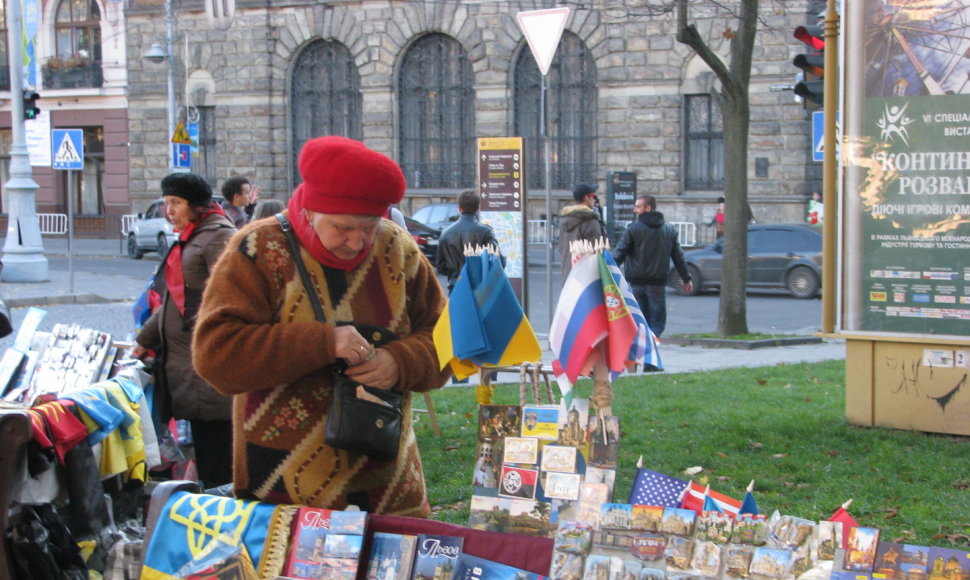Will Ukraine manage to withstand pressures from Moscow and move closer to the West? This was the topic discussed among European policy makers and journalist in an international conference in Lviv last weekend.
Carrot after sticks
Worn-down historic buildings, construction workers drunk early in the morning, children and old ladies begging for money alongside shining new cars, luxury, and crowds of tourists. Such contrasts are a staple of Lviv, often dubbed the capital of western Ukraine. It is the most western-looking town in the country, but even here, one month before the projected signing of the EU Association Agreement, communicating in English is a challenge.
Ukraine is still completely within the Russian information space and sphere of influence, but the country is already getting weary of the dependency. Ukrainians have put up with the whims of the “big brother” for a long time, but did not get all the perks promised in exchange. Recently, Ukraine has been feeling bullied by Russia who wants its western neighbour to join the Eurasian Customs Union instead of nurturing closer ties with the European Union.
Moscow has changed its tactics – this week it extended a promise to give a discount on gas and push back a deadline for paying back a loan.
Initially, Russia employed brutal measures and pressure in order to convince Ukraine. The country has suffered more Russia's “economic wars” than any other – since 2006, exports of various Ukrainian-made products to Russia have been halted eight times. Moreover, once Moscow cut off gas supply to Ukraine.
It did not work – Ukraine still seems determined to get closer to Europe. Therefore Moscow has changed its tactics – this week it extended a promise to give a discount on gas and push back a deadline for paying back a loan.
Moreover, Russian President Vladimir Putin has suggested that Ukraine should not sign the agreement with the EU without consulting him personally first. Moscow seems to have a last-minute offer for a country slipping out of its grip.
Meanwhile the European Union offers little in the way of treats; instead, there is a whole lot of requirements: to release Yulia Tymoshenko, Ukraine's former prime minister, from prison, to reform the Prosecutor General's Office, make changes to the elections code.
Marriage of convenience
“We are on a crossroad and must now choose where we are going,” admits Ukrainian political scientist Taras Voznyak who took part in the international conference in Lviv.
He is convinced that Ukraine will put a signature on the EU Association Agreement in Vilnius this November. According to Voznyak, both Ukraine's opposition parties and President Viktor Yanukovich, who was deemed pro-Russian, agree on the policy goal to integrate the country into European structures.
Ukrainians feel that the number-one advantage they are getting from the EU treaty is the possibility to go to Poland without a visa. They are not moved by economic arguments because they are too abstract, while administrative reforms threaten to disrupt the system which is corrupt but familiar.
He notes that Ukraine is not a poor country and can bring something to the table for the EU. “Europe has already done all the calculations. Trust me, this will not be a marriage of love. This will be a marriage of convenience,” Voznyak told 15min.lt.
To Poland without visa
It goes without saying that Ukraine, too, will draw much benefit from the treaty. Curiously enough, though, all the Ukrainians who spoke to 15min.lt did not name economic prospects or democratic reforms as the top perk of getting closer to the EU. Rather, they are more enthusiastic about visa-free trips to Poland.
Natalka Snyadanko, a well-known journalist from Lviv, says that Ukrainians who apply for a visa are subjected to various humiliations: they are asked to give bribes, answer absurd questions, and even when they have a visa in their passports, that still does not guarantee they will be admitted to the neighbouring country. Therefore they feel that the number-one advantage they are getting from the EU treaty is the possibility to go to Poland without a visa.
Snyadanko notes that Ukrainians are not moved by economic arguments because they are too abstract, while administrative reforms threaten to disrupt the system which is corrupt but familiar.
The journalist says Ukraine is not yet ready to join the union of values associated with the EU. That, she says, is signalled by a recently held vote on LGBT rights: “Ukraine has lately adopted a lot of legislation to do with EU integration, but not a law on extending the rights of sexual minorities. No one is disputing economic laws. We need change, but when we start discussing values, there are many questions.”
Indifference from the West
German politicians and journalists who came to the conference were sceptical about Ukraine's chances of joining the European space. Günter Verheugen, former EU Commissioner for Enlargement, said in 2004 that he did not see Ukraine, Russia, or Belarus ever becoming part of the EU. Now, he reiterated the position that Ukraine's membership in the European space was doubtful: “Every country can join, but it is wrong to assume that the joining is up to the EU and not Ukraine.”
Verheugen shared that, before his trip to Lviv, he had received phone calls from many a European prime minister, begging him not to make any promises to Ukraine.
Politicians in some states still believe they will not be able to explain to their countries why economically and politically backward Ukraine should join the EU, says Günter Verheugen.
“Politicians in some states still believe they will not be able to explain to their countries why economically and politically backward Ukraine should join the EU,” Verheugen said.
German journalists were even less flattering, even calling Ukraine a “failed state.”
Jakob Preuss, adviser to the German Green Party, journalist, and documentary filmmaker, said that Ukraine had even more problems with corruption than Russia: “We have seen radical changes in those countries that joined the EU in 2004 – Lithuania, Latvia, Poland, Estonia – while Ukraine did not make a single step forward since then. There have been no fundamental changes, therefore I say that I cannot see it in the European community at the moment. In the future, sure, things can change.”
Support of Poland and Lithuania
It is not at random that Russia chose Lithuania as the target for economic sanctions in the run-up to the Eastern Partnership Summit. It is not only that Vilnius will host the meeting which is expected to result in the EU-Ukraine treaty – Lithuania and Poland are the two most vocal supporters in Ukraine's path towards the EU.
Launched by efforts of former President Valdas Adamkus, the Eastern Partnership programme is still very dear to Lithuania. Vilnius is convinced that having Europe's second-biggest country, with a population of 46 million, switch to the EU side would be a major victory for the union and a loss for Russia.
MEP Dariusz Rosati, former foreign minister of Poland, said in Lviv that the European Union should be more welcoming to Ukraine: “I am very disappointed that the EU does not appreciate the benefits of Eastern Partnership.”
Rosati acknowledges that EU countries hold different views on the prospects for the union to grow and that it could use a strategic vision in this area.
“It seems so far that Russia, imposing economic blockades and cutting off gas supply, has a much greater effect on Ukraine than the European Union, even though it spends 600 million euros on the Eastern Partnership programme. I think that Europe still shows its complete incomprehension of the situation in Eastern Europe,” he said.
Rosati notes that even Lithuania and Poland, interested as they are in seeing Ukraine draw closer to Europe, are not saying that membership should be given to Ukraine as a present – however, it must be done once the country implements all that is required of it.



















